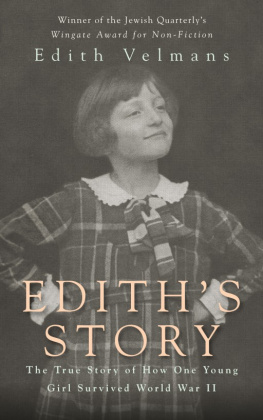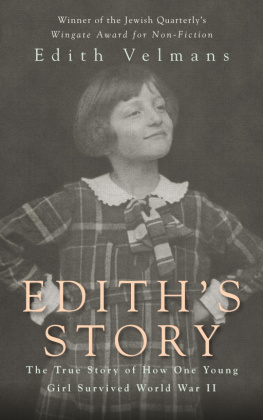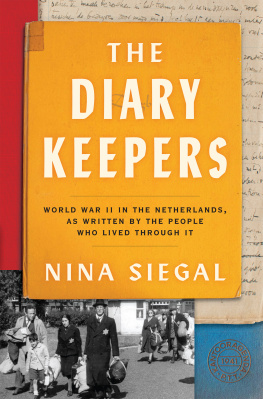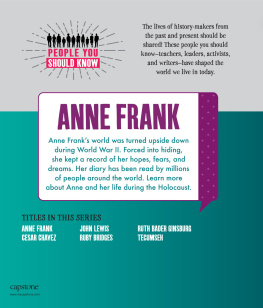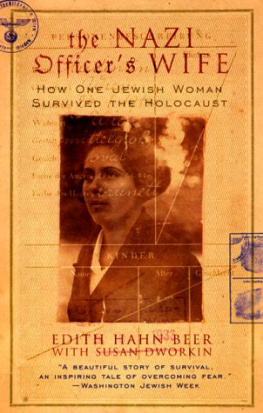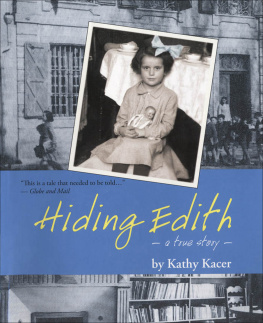Praise for Edith's Story
Its impossible to getthrough this inspiring and great-hearted volume dry-eyed, orwithout admiration for people who so bravely persevere throughunimaginable hardship and privation. - TheWashington Post
Velmans candid portrayalof herself as a feisty, loving, sometimes self-absorbed teenager isthoroughly engaging and her story throws a new light on the plightof Jews who survived the war hidden in plain sight. - Publishers Weekly
Ediths story gives all thepain and pleasure of reading Anne Frank for the first time. -Esther Freud, The Guardian (Books of the Year)
A significant HolocaustmemoirA valuable opportunity to see the situation just outsideAnnes attic. - Kirkus Reviews
A quiet, gripping narrativewith the writers hindsight and restrained commentary. - ALA Booklist (starredreview)
The miracle of this storyis not that Edith survived, but that she survived with her love oflife intact. - The RoanokeTimes
Both memoir and meditation,it is moving and wiseneither sanguine nor sentimental about theHolocaust and mans capacity for evil. It shows that a belief ingoodnessis the key to living well with such a past. The most vividevocation of the experience of Nazi Occupation I have ever read -Linda Holt, The Independent (London)
Truly moving, leaving onewith a great hope in humanitybeautifully written. - JuliaNeuberger, The London Times
Ediths Story
by
Edith Velmans
Copyright 1998 by Edith Velmans.
All rights reserved.
No part of this book may bereproduced or transmitted in any form or by any means withoutpermission in writing from the publisher:
Publishing History
Ediths Book first published in Great Britain by Viking 1998;Penguin Books 1999
Ediths Story first published in the USA by Soho Press 1999;Bantam trade paperback 2001
Van Horton Books paperback edition and e-book2014
Edith Velmans original wartime diaries arekept in the Jewish Historical Museum of Amsterdam.
Library of Congress Catalog Card Number:99-26931
ISBN 978-0-9835505-5-6
For Anya, Jack, Nicholas, Saskia and Luca
Its strange how much youcan bear, if your doom is parceled out to you in small doses. Itsjust like poison: if you start taking it very gradually, increasingthe quantity drop by drop, then your body will eventually get usedto it.
- David van Hessen, May 1943
Table of Contents
FranssJacket
Author'sNote
Prologue
It is July 1950. I am lying in a hospitalbed in Amsterdam, my two babies in my arms. My doctor tells me theodds of having twins are just one in seventy-eight. He says this asif its quite an achievement. An instant family! Sure, I think tomyself. If I keep having two at a time, we can have the worldrepopulated in no time.
Because when I hear numbers like that Icant help thinking of the grimmer statistics. Of the 140,000 Jewsin Holland before the war broke out ten years ago, fewer than30,000 have survived - about one in five. Of the six of us in myimmediate family, two are left.
A few moments after the first baby was outand I was lying there exhausted, Dr Herzberger leaned over me andsaid hopefully, Theres at least one more in there.
After a long hard labor, I had no patiencefor the doctors sense of humor. Ach laat maar zitten, I groaned.Which means: Oh just leave it in there, then.
But it was no joke. Twenty minutes lateranother full-term, six-and-a-half-pound baby was born.
After Loet, the beaming father, had gonehome for a few hours sleep, Aunt Tine suddenly appeared at mybedside. She was the first to be allowed in - well before thevisiting hour. She told the nurses she was the grandmother. Shehugged me with tears in her eyes, and I was very moved.
Now it is the next day, and I am having acozy chat with the new mother in the bed across from mine. Her nameis Miep Gies, and she is radiant. She is holding a baby boy - Paul.She tells me how she and her husband Jan had been longing for thismoment. She is fifteen years older than me, and has been waiting along time for a child. We got married, and then the war intervened- you know, she says.
I know, I say, nodding.
The nurses walk into our room and startshowing us how to put our babies to our breasts. I look around andask the nurse, But what should I do? The nurse says calmly, Thesame as everyone else! Who, me? But, I meanIve got two!Youve got two breasts, havent you? she says sensibly. Wellthen!
Much to my astonishment, it works. I nursemy two babies, one at a time. When the other mothers have finishedand can lie back and rest, I have to start all over again with theother twin. But we do it honestly, fairly, alternating breasts sothat one will not have more than the other.
The days in the maternity ward fly by. MiepGies and I compare and admire each others babies, dostomach-tightening exercises together, giggle like schoolgirlsbehind the strict nurses backs and exchange confidences. Afterbeing introduced to Aunt Tine and hearing me explain how exactlyshe is related to me (Tine zur Kleinsmiede is the woman who hid mefrom the Nazis during the war), my new friend Miep tells me thatshe, too, helped to hide a Jewish family, right here in Amsterdam.She stops and bites her lip, staring out of the window.
What happened? I ask softly. Not that Icant guess.
They were betrayed in the end. 1944. Wedont know by whom. Only Mr Frank came back from the camps. Theyhad two daughters - Margot and Anne. She dabs at her eyes.
I sigh. Its a familiar story. Everyone youmeet has lost someone in the war.
Another day Miep sees me scribbling in thebaby book I have enthusiastically begun for the twins.
Oh, Anne was always writing too, she says.You know, Mr Franks daughter. She always said she wanted to be awriter when she grew up. She kept a diary. After the Nazis came forthem, I took it and saved it for her. Now Mr Frank has had itpublished.
Really! I say politely. Id like to readit some day.
I dont say this to Miep, but I dont thinkthat very many people will be interested in reading this poorgirls diary. Lots of people must have kept diaries during the war- I know this because even I kept a diary. I have a suitcase fullof journals dating from the war years. Anne Franks story must bemuch sadder than mine, of course, because she died. Yet even shewas just one of the thousands - no, millions of victims.
I sigh. In postwar Holland, nobody likes totalk much about the war any more. We who are left are too busyrebuilding our world to dwell on the past. We are just trying toget on with our lives as best we can.
--
Miep Giess little boy Paul is constantlyhungry. Miep has been having trouble breast-feeding, as her milkhas not come in abundantly enough. I, on the other hand, amlactating like a leaky faucet. Because I am spending twice as muchtime nursing as the other new mothers, my glands areover-stimulated and produce so much milk that I have to stufflittle glass receptacles into my bra to catch the overflow.
The nurses have come up with a mostpractical solution. When Mieps baby is crying because he is notsatisfied, they collect my excess milk and give it to him in abottle.
Miep is allowed to leave the hospital afterten days, while I, as the mother of twins, have to stay anotherweek. Miep and I part as friends for life. Jan Gies, Miepshusband, returns every day to the hospital to collect my milk forhis son. When I am finally allowed to go home, we continue theroutine for another two weeks. Finally little Pauls appetitelevels off, and Jans visits to our apartment, armed with his milkbottle, cease.
I dont get around to reading Anne Franksdiary until years later, when Anne has become a legend in theworld.
--
There is another Miep in my life - MiepFernandes, my best friend from school. It was to this Miep that Igave my diaries for safekeeping the day before I went into hiding.They were packed neatly into my little black patent leathersuitcase. Actually, the suitcase wasnt really mine, it was Omis.It used to contain the folded white lace-trimmed linens (chemise,robe, socks and bonnet) that my grandmother intended to be buriedin. When the Germans invaded Holland and Father instructed each ofus to pack up our most precious belongings in case we had to make arun for an air-raid shelter, Omis suitcase was the only thing Icould find that was just the right size. I appropriated thesuitcase for my journals and dumped Omis funeral clothesunceremoniously into a drawer.

